Ազգային ինքնության բաղադրիչները միայն լեզուն և հավատքը չեն:Ազգային ինքնության ձևավորող կարևոր գործոն է մշակույթը:Մշակույթ հասկացությանը տասնյակ անգամ հարյուրաոր սահմանումներ ունի:Այդ սահմանումներից մեկի համաձայն մշակույթը մարդկության ստեղծած նյութական հոգևոր արժեքների ամբողջությունն է:
Месяц: Декабрь 2021
Կոնֆլիկտ
իմ կարծիքով կոնֆլիկտ մասին խոսելուց առաջ պետք է հասկանալ թե ինչե կոնֆլիկտը, դա կողմերի բախում, հակամարտություն, որի ընթացքում կողմերից գոնե մեկը հակառակ կողմի գործողություններն ընկալում է որպես իր սեփական հետաքրքրություններին ուղղված սպառնալիք անհամաձայնությնուն է և իմ կարծիքով կոնֆլիկտը այդքանել դրական բան չի քանի որ կան ոչ ադեկվատ մարդիկ որոնք կոնֆլիկտը վերածում են կռվի կամ այհոյանքի բայց, կան կոնֆլիկտներ որոնք համերաշխ լուծվում են առանձ որովե կռվի նաև կան տարբեր կոնֆլիկտների տեսակներ որոնք նշված են ներքև ում
Ներանձնային և միջանձնային կոնֆլիկտ
Ներանձնային կոնֆլիկտի դեպքում, երբ մարդը կոնֆլիկտի մեջ է մտնում ինքն իր հետ, առկա է այսպես կոչված, անձի երկվության երևույթը:
Միջանձնային կամ միջխմբային կոնֆլիկտը կարելի է սահմանել կոնֆլիկտող կողմերի նպատակների և վարքի (գործողությունների) համատեղելիության տարբեր վարիացիաների միջոցով, որն առավել ամբողջական տեսք ունի հետևյալ աղյուսակում.
Ներանձնային
- Հավասարաչափ դրական հնարավորությունների կոնֆլիկտ։ երկու լավ հնարավորությունների միջեւ։
- Հավասարաչափ բացասական հնարավորությունների կոնֆլիկտ։ փասուստ իսկ եթե հնարավոր չէ հանգեցնում է ուժես սթրեսային իրավիճակի
- Դրական-բացասական հնարավորությունների կոնֆլիկտ։ ընտանիքին նվիրված եւ ուշ վերադարձող մարդ, աշխատավարձի բարձրացում սակայն հոգսաշատ եւ նյարդային աշխատանք։
- Ես-դեր կոնֆլիկտ, մարդը չունի իր պաշտոնին համապատասխան գիտելիքներ հմտություններ եւ ունակություններ
- Միջդերային կոնֆլիկտ – ղեկավարը պարտավոր է պահանջել բոլորից կազմակերպության կարգի պահպանում սակայն տվյալ կազմակերպությունում աշխատում են նաեւ նրա ընկերները եւ բարեկամները։
կենսաբանության դեկտեմբեր ամսվա ամփոփում
հարց արաջին՝ գրել մկանների կառուցվացքը և գործողությունները։
Յուրաքանչյուր մկանաթել ունի լայնակի շերտավոր կառուցվածք, որը պայմանավորված է նրա մեջ գտնվող հարյուրավոր սպիտակուցային թելերի`միոֆիբրիլների որոշակի դասավորությամբ։Մկանաթելերի խրցերում լայնակի շերտավորությունն ավելի է ընդգծվում, որի համար ստացել են միջաձիգ զոլավոր մկան անունը։ Յուրաքանչյուր մկանին մոտենում են զգացող և շարժիչ նյարդաթելեր։ Մկաններն իրենց ծայրերի ջլերով ամրանում են ոսկրերին։
հարց երկրորդ՝ որ մկաներնեն համազդիչ և հակազդիչ։
Մկանների շնորհիվ մարմինը պահպանում է հավասարակշռությունը, տեղաշարժվում է տարածության մեջ, իրականացնում կրծքավանդակի ու ստոծանու շարժումները, կլլման ակտը, աչքի շարժումները, ներքին օրգանների, այդ թվում՝ սրտի աշխատանքը։ Միջաձիգ զոլավոր մկանների դերն օրգանիզմում բազմազան է։ Նրանք մասնակցում են մարմնի խոռոչների և օրգանների պատերի կազմությանը (կրծքի, որովայնի խոռոչ, ըմպան, կոկորդ) ապահովում են մարմնի կեցվածքը, հավասարակշռությունը, ձայնի առաջացումը։ Միջաձիգ զոլավոր մկանները մասնակցում են շնչառական և կլլման շարժումներին, ձևավորում են դիմախաղը, ապահովում ակնաշարժ և ծամիչ ապարատի գործունեությունը։ Նրանց կծկումը կմախքի հետ միասին ապահովում է մարմնի տեղափոխությունըտարածության մեջ, ջերմության առաջացումը։
հարց երրորդ՝ գրել արյան բաղադրությունը և ձևաոր տարրերի մասին:
Մկանների շնորհիվ մարմինը պահպանում է հավասարակշռությունը, տեղաշարժվում է տարածության մեջ, իրականացնում կրծքավանդակի ու ստոծանու շարժումները, կլլման ակտը, աչքի շարժումները, ներքին օրգանների, այդ թվում՝ սրտի աշխատանքը։ Միջաձիգ զոլավոր մկանների դերն օրգանիզմում բազմազան է։ Նրանք մասնակցում են մարմնի խոռոչների և օրգանների պատերի կազմությանը (կրծքի, որովայնի խոռոչ, ըմպան, կոկորդ) ապահովում են մարմնի կեցվածքը, հավասարակշռությունը, ձայնի առաջացումը։ Միջաձիգ զոլավոր մկանները մասնակցում են շնչառական և կլլման շարժումներին, ձևավորում են դիմախաղը, ապահովում ակնաշարժ և ծամիչ ապարատի գործունեությունը։ Նրանց կծկումը կմախքի հետ միասին ապահովում է մարմնի տեղափոխությունըտարածության մեջ, ջերմության առաջացումը։
հարց չորրորդ ՝ համառոտ գրել էրիթրոցիտների և լեյկոցիտների ֆունկցիաների մասին։
էրիթրոցիտներ տեղափողումեն թթվածինը օրգանիզմին, իսկ լեյկոցիտները պայքարում են վարակների և հիվանդությունների դեմ։
հարց հինգերորդ՝ գրել արյան բաղադրության փոփոխության հետևանքով աղաջացած հիվանդությունների մասին։
Սեպսիս
Արյան վարակում, թարախարյունություն, ընդհանուր թարախային վարակ, ծանր վարակ, հիվանդություն, որն առաջանում է թարախային բորբոքման տեղային օջախից արյան հունի, ավշային ուղիների, այնտեղից հիվանդի բոլոր հյուսվածքների և օրգանների մեջ թարախածին մանրէների տարածման հետևանքով։ Սեպսիսի աղբյուր կարող է դառնալ վարակված վերքը կամ տարբեր տեղադրության, մեծության ու ծավալի թարախային օջախը։ Նորածինների սեպսիսի հաճախակի պատճառներից է պորտի թարախակալումը։
Español
1.Կարդալ տեքստը և պատասխանել հարցերին։
Paola aprende español
Me llamo Paola, soy una chica italiana. Tengo dieciséis años y aprendo español en el instituto. Somos treinta alumnos en clase. Nuestro profesor se llama Alberto y es de Sevilla, una ciudad de España, pero hace cinco años que vive en Italia. Tiene treinta y ocho años. Está casado con una chica italiana y tienen dos hijos. Alberto habla muy bien el italiano, pero no entiende inglés.
En clase de español nos divertimos mucho. Hacemos cosas diferentes: leemos textos, aprendemos palabras nuevas, escuchamos canciones y escribimos diálogos. El profesor nos habla todo el tiempo en español. Es un poco difícil pero a mí me gusta mucho hablar en español. Tengo clases de español todos los días menos los martes y los viernes.
Mis amigas y yo comemos en el colegio los martes y los jueves porque por las tardes jugamos al baloncesto. Después voy a casa y antes de cenar siempre hago mis deberes.
Los fines de semana practico español con mi amigo Fernando, es de Madrid. Hablamos por Internet y me corrige cuando escribo mal. También me gusta leer y a veces voy al cine con mis amigos.
- El profesor de español habla español e italiano
a) español e italiano
b) español, italiano e inglés
c) solo español - En la clase de Paola hay treintayochoestudiantes.
a) dieciséis
b) treinta
c) treintayocho - Paola tiene clase de español los martes y los viernes
a) todos los días
b) los lunes, miércoles y jueves
c) los martes y los viernes - Dos días a la semana por las tardes Paola juega al baloncesto
a) escucha música
b) hace sus deberes
c) juega al baloncesto - A Paola le gusta mucho hablar en español
a) hablar en español
b)jugar al fútbol
c)comer en el colegio - Paola y sus amigas comen en el colegio dos veces a la semana
a)todos los días
b)tres días a la semana
c)dos veces a la semana
María: Pues, a mí…….(mí gusta / me gusta) el vestido negro.
2.Կարդալ երկխոսությունը և ընտրել ճիշտ պատասխանը։
Ana: Mamá, esta noche tengo una cena de trabajo, ¿qué me …….(pongo /pones)
Ana: No sé, ¿me lo pruebo?
María: Sí, buena idea. ¿Cómo……. (te queda / quedan?)
Ana: Me gusta, pero ……(prefero / prefiero ) la camisa de rayas con un pantalón vaquero.
María: Vale, pero ese estilo es más informal.
Ana: No importa, a mí me gusta.
María: (¿Dónde / Qué )………es la fiesta?
Ana: En casa…….( de / a ) mi jefe. Su casa…….. (es / está) cerca del centro.
María: Ponte lo que quieras.
Ana: Mamá…..(soy / estoy )muy nerviosa y me duele el estómago.
3.Ընտրել ճիշտ տարբերակը։
- -¿Qué eres ?
-Soy enfermera.
a. trabajan b.hago c. eres - -¿………………dormitorios tiene tu casa? -Dos.
a. Qué b. Cómo c. Cuántos - -¿Dónde………………la cocina? -Al final del pasillo.
a. está b. es c. hay - -¿Qué hora………………? -………………..las dos y media.
a. son / son b. es / son c. son / es - Mis clases de español………………a las seis de la tarde. a. empiezo b. empieza c. empiezan
- -¿A qué hora………………levantas? -………………levanto a las siete en punto. a. te / me b. se / me c. tú / yo
- ¿Quiere probarse estos pantalones………………? a. blancas b. blanco c. blancos
- Estoy………………..para el examen de matemáticas. a. estudio b.estudiado c.estudiando
- -Perdone, ¿………………una farmacia cerca? -Sí, muy cerca.
a. está b. hay c. dónde - Cada noche……………….a las diez y media.
a. me acuesto b. me acosto c. acuesto - Por la mañana voy……………la escuela……………autobús. a. en / de b. de / a c. a / en
¡BUENA SUERTE
Նոր տարին Մեքսիկայում
Մեքսիկայում Սուրբ Ծնունդը նշվում է դեկտեմբերի 12-ից հունվարի 6-ը։
Դեկտեմբերի 16-ից մինչև Սուրբ Ծննդյան նախօրեին երեխաները հաճախ կատարում են «Պոսադա» երթերը կամ Պոսադաները: Posada-ն իսպաներեն նշանակում է հյուրանոց կամ կացարան: Կան ինը Posada: Նրանք նշում են Սուրբ Ծննդյան պատմության այն հատվածը, որտեղ Ջոզեֆը և Մարիամը փնտրում էին մնալու տեղ: Posadas-ի համար տների արտաքին մասը զարդարված է մշտադալար բույսերով, մամուռով և թղթե լապտերներով: Պոսադաների ճանապարհը լուսավորելը կարող է լինել «լյումինարիա» կամ «ֆարոլիտոս»: Սրանք թղթե պարկեր են՝ դրանց մեջ կտրված ձևերով, որոնք մասամբ լցված են ավազով, իսկ հետո մոմ են դնում դրանց մեջ։ Նրանք ներկայացնում են «ճանապարհը լուսավորող» Մարիամի և Հովսեփի համար ինչ-որ տեղ մնալու համար:

Յուրաքանչյուր Posada-ում երեխաներին տրվում են մոմեր և տախտակ՝ ավանակի վրա հեծած Մարիամի և Հովսեփի կավե պատկերներով, որպեսզի վերամշակեն փողոցները: Նրանք զանգում են ընկերների և հարևանների տուն և յուրաքանչյուր տանը երգ են երգում: Երգը, որը նրանք երգում են, Հովսեփի և Մարիամի մասին է, որոնք տանը սենյակ են խնդրում: Բայց երեխաներին ասում են, որ տանը տեղ չկա, և նրանք պետք է գնան։ Ի վերջո, նրանց ասում են, որ տեղ կա և ողջունվում են: Երբ երեխաները տուն են մտնում, նրանք գոհության աղոթք են ասում, իսկ հետո խնջույք են կազմակերպում՝ ուտելիքով, խաղերով և հրավառությամբ:
Christmas in Finland

Finnish people believe that Santa Claus or Father Christmas lives in the north part of Finland called Korvatunturi (or Lapland), north of the Arctic Circle. People from all over the world send letters to Santa Claus in Finland. There is a big tourist theme park called ‘Christmas Land’ in the north of Finland, near to where they say that Father Christmas lives. 
It means that Santa doesn’t have far to travel on Christmas Eve to deliver presents to people in Finland! If he doesn’t get a chance to deliver the presents personally, he will often leave them under the Christmas tree.
In Finland, Santa might also be known as Joulupukki! (This really means ‘Christmas Goat’ as it was traditional in Finland that there was a Yule Goat who was scary and asked people for presents — and certainly didn’t give any out! Over time the goat became the gift giver and then Santa took over the gift giving duties but the name of the Christmas Goat was still retained in Finland!) Joulupukki rides with reindeer leaves gifts under the Christmas tree but if you have been naughty you could end up with a bag of coal!
UNUSUAL CHRISTMAS TRADITIONS FROM AROUND THE WORLD
While Christmas may have started as a Christian holiday, and is often still celebrated as such, people from all over the world have embraced the festive season and added their own traditions along the way.
Manger scenes, Santa Claus, and smiley snowmen still reign supreme, but if you look hard enough you’ll discover some very different takes on December’s most famous day. These are some of the most unusual Christmas traditions around the world.
BAD SANTA | AUSTRIA

British kids are well acquainted with Father Christmas, Santa Claus or Saint Nick, but they can consider themselves lucky they don’t live in Austria. That’s because it’s here that a ghoulish creature called ‘Krampus’, the evil accomplice of St Nicholas, is said to wander the streets in search of badly behaved children. During the month of December, you can expect to see terrifying masked figures out and about scaring kids and adults alike with ghastly pranks.
If this holiday tradition sounds like your kind of thing, be sure to check out the annual Krampus paradise in Vienna.
A COBWEB CHRISTMAS | UKRAINE
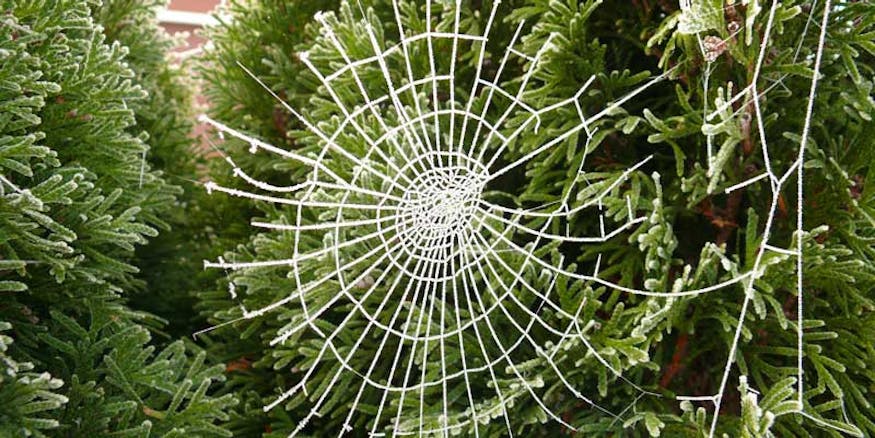
One of Ukraine’s favourite festive traditions is not one for those with a fear of creepy crawlies! Where we would have baubles, tinsel and stars, Ukrainians use decorations that mimic the natural formation of spiders’ webs shimmering with dew.
The tradition goes back to a folktale about a poor widow who could not afford to decorate a tree for her children. Legend has it that spiders in the house took pity on the family, and spun beautiful webs all over the tree, which the children awoke to find on Christmas morning. Spiders’ webs are also considered to be lucky in Ukrainian culture.
COLONEL SANTA | JAPAN
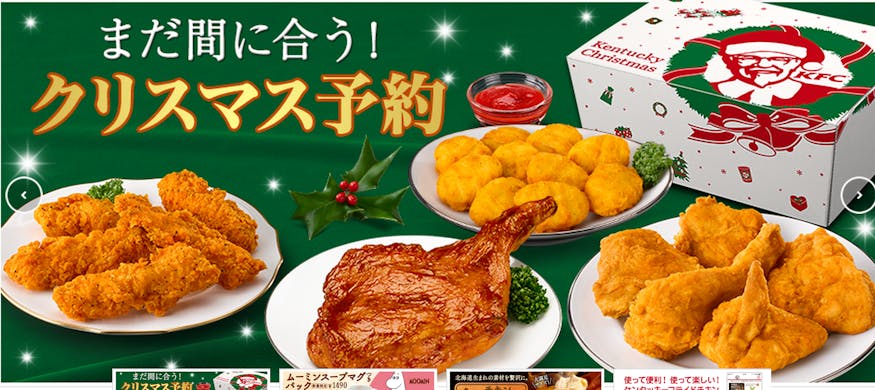
Back in 1974, the American fast food restaurant KFC released a festive marketing campaign in Japan. The seemingly simple slogan “Kurisumasu ni wa kentakkii!” (Kentucky for Christmas!) spawned a national tradition that still thrives to this day. Although Christmas isn’t a national holiday in Japan, families from all over the country head to their local KFC for a special Christmas Eve meal.
While it might be fast food, expect to pay a higher premium on the biggest sales day of the year. A KFC Christmas dinner clocks in at around 3,336 yen (£20).
Pickle in tree in Germany
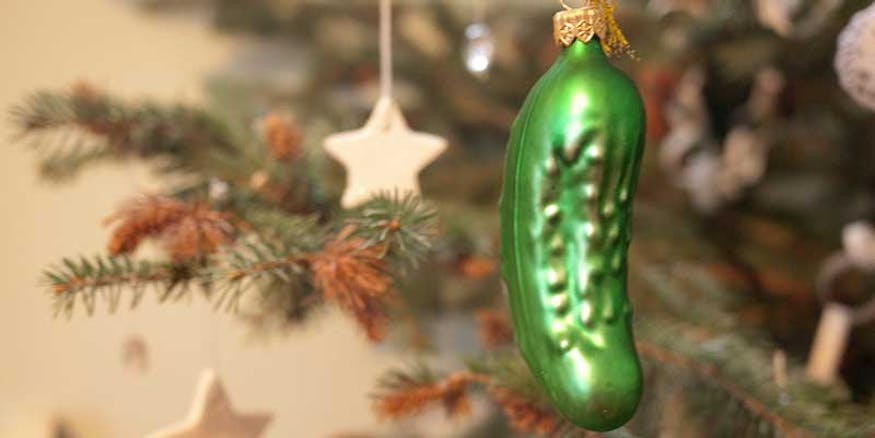 Image by Jamie Anderson under Creative Commons license.
Image by Jamie Anderson under Creative Commons license.
The Christmas tree tradition embraced around the world today is believed to have started in Germany back in the 16th Century, so it comes as no surprise that our continental cousins still have some unique customs relating to the festive conifers. One of these is to hide a pickle somewhere within the branches of the tree, and give a gift to whichever child in the household finds it.
Some claim that the tradition may not be German after all. One legend says that the Christmas pickle originated in Spain, when two young boys were held as prisoners inside a pickle barrel. The heroic Saint Nicholas rescued the boys and brought them back to life. Either way, a pickle on the Christmas tree is a tradition we can totally get behind.
English 8


At more than 1,450 bicycle stations, people can take bikes and leave them.
Some people still use cars to travel across the city.
Politicians think the Velib scheme might help to make the air in Paris cleaner.
If we don’t change the situation, the problem of pollution will get bigger.

2. Well, I think no yet. But I hope that in future it will happen.

Traffic jams — a line of very slow-moving traffic, an accident, or heavy congestion.
Pollution — the introduction of harmful materials into the environment
Exhaust fumes — gases ejected from an engine as waste products.
Reduce pollution levels —less waste to control, treat, or dispose of
Atmosphere — the layers of gases surrounding a planet
Factory fumes — the unpleasant and often unhealthy smoke and gases that are produced by fires
Global warming — increases heat-trapping greenhouse gas levels in Earth’s atmosphere.
Dramatic climate changes — increased temperature trends described by global warming
Disappearing — not being visible.
Rise — an increase in amount, number, or volume a rise in prices.
Environment —the circumstances, objects, or conditions by which one is surrounded.

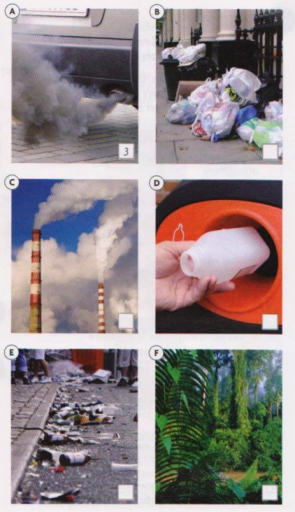
2-E
4-C
5-F
6-B
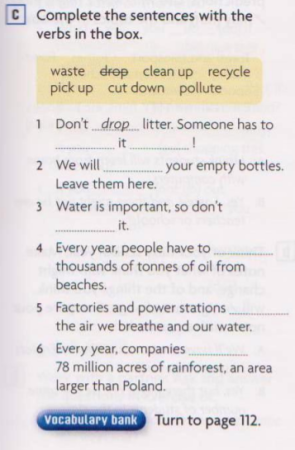
We will recycle your empty bottles. Leave them here.
Water is important, so don’t waste it.
Every year, people have to clean up thousands of tonnes of oil from beaches.
Factories and power stations pollute the air we breathe and our water.
Every year,companies cut down 78 million acres of rainforest, an area larger than Poland.
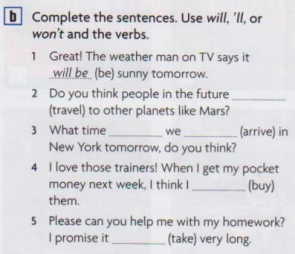
3. What time will we arrive in New York tomorrow, do you think?
4. I love those trainers! When I get my pocket money next week, I think I’ll buy them.
5. Please can you help me with my homework? I promise it won’t take very long.

I don’t know if this book is a good present for my brother. He might not like it.
Don’t put that glass there! Someone might break it.
I’m worried about my maths test tomorrow. I might not pass it!
In the future, people will probably travel in space and they might live on other planets.
I feel awful. I think I might have a flu.
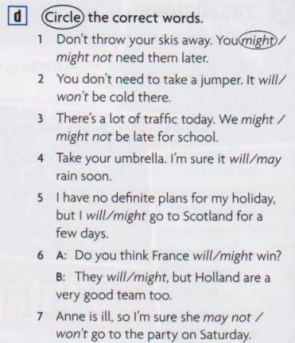
You don’t need to take a jumper. It won’t be cold there.
There’s a lot of traffic today. We might be late for school.
Take your umbrella. I’m sure it will rain soon.
I have no definite plans for my holiday, but I will go to Scotland for a few days.
Do you think France will win?
They might, but Holland are a very good team too.
Anne is ill, so I’m sure she may not go to the party on Saturday.
English 8


1-saw
2-was looking
3-started
4-ws croosing
5-heard
6-came
7-stoped
8-didn’t hit

2-easy, easier, easiest
3-exciting, more exciting, most exciting
4-bad, worst, worse

2-happily
3-fluently
4-badly
5-easly
6-goodly

2-slow
3-expensive
4-ugly
5-messy
6-noisy
7-diificult

2-get very old
3-got a surprised
4-get home
5-got good ideas
6-get the answer
English 8
Write the Comparative forms of the adjectives:
0. tall – taller
1. fast, faster, fastest
2. heavy, heavier, haviest
3. dangerous, more dangerous, most dangerous
4. small, smaller, smallest
5. large , larger, largest
6. Light, lighter, lightest
7. rare, rarer, rarest
8. common, more common, most common
9. bad, worse, the worst
10. Good, better, the best
Correct the sentences
1. Cats are popularer than snakes as pets.
Cats are more popular than snakes as pets.
2. Pigs are more intelligent as other animals.
Pigs are most intelligent as other animals.
3. Turtles are slow than crocodiles.
Turtles are slower than crocodiles
4. Elephants are heavyer than pigs.
Elephants are heavier than pigs.
5. Bears are more rare than snakes.
Bears are rarer than snakes.
Complete the sentences
A.
1. I am taller than my sister.
2. My mum thinks that cats are better pets than dogs.
3. Cycling is one of dangerous sports.
4. I want to have big car.
5. A blue whale is heavier than twenty-five elephants.
6. You look thinner that (thin) last month. Have you lost weight?
7. Bicycles are slower than (slow) cars.
8. She is the nicest (nice) person I know.
9. What is the best film you´ve seen?
10. Computers are cheaper than mobile phones.
11. Is your brother taller than you?
12. I think Spanish is easier than Japanese.
13. Our dog is nicer than your dog.
14. Glass bottles are better than plastic bottles.
15. I think Rafael Nadal is the best tennis player in Spain.
16. Sharks are more dangerous than other fish.
17. This situation is more serious than the last one.
18. He is smarter than his brother.
19. My brother wanted most expensive trainers in the shop.
20. Today is the best day of the year.
21. Daniela is funnier than me.
22. My house is large.
23. Mount Everest is the highest mountain in the world.
24. The sea is larger than a lake.
25. My job is easier than yours.
26. London is the bigest city in England.
27. This car is more comfortable than yours.
28. He is the richest man in town.
29. I am stronger than you.
30. A baby blue whale gets bigger than a great white shark.
1. A Mercedes is more expensive a Fiat.
2. Maradona is the best football player ever.
3. A swordfish is faster than a jellyfish.
4. Julio is more friendly than Carlos.
5. Irene is cleverer than Sveta .
6. Comedies are funnier than police dramas.
7. Pablo is bigger than Juanma.
8. Max is older than John.
9. Adriano is faster than Ronaldo.
10. My hair is longer than yours.
11. A dolphin is more intelligent than a shark.
12. Elaine is wiser than her sister.
13. Tony is happier than Max.
14. Sandra is busier than Sam.
15. Skiing is the most dangerous football.
16. This is narrower than of all roads in Málaga.
17. Health is more important than money.
18. Those cakes are the worst I´ve ever tasted.
19. My dog is the best dog in the world.
20. Patricia’s house is smaller than Linda’s .
21. A car is faster than a bike.
22. My laptop is faster than yours.
23. The ant is smaller than insect.
24. This lamp is the brightest one in the room.
25. My house is cleaner than her house.
26. Jack is the tallest boy in his class.
27. Steven Spielberg is the best film director in the world.
28. This dress is older than that one.
29. A sea lion is heavier than a lobster.
30. A sports car is faster than a motorbike.
Write comparative and superlative adjectives
1. clean cleaner cleanest
2. easy, easier easiest
3. good, better, the best
4. dirty,, dirtier dirtiest
5. fat, fatter, fattest
6. beautiful, more beautiful, most beautiful
7. sad sadder, saddest
8. flat, flatter, flattest
9. active more active, most active
10. comfortable more comfortable, most comfortable
11. hot hotter, hottest
12. happy, happier, happiest
13. wet, wetter, wattest
14. narrow narrower, narrowest
15. big, bigger, biggest
16. busy, busier, busiest
17. noisy, noisier, noisiest
18. friendly, friendlier, friendliest
19. thin, thinner, thinnest
20. little, less, the least
21. bad worse, the worst
22. few, fewer, fewest
23. much, more, the most
24. many, more, the most
25. rich¸ richer, richest
Comparative or superlative
1. Jeremy is 10 years old. Julie is 8 years old. Jeremy is older than Julie
2. The Alps are very high. They are higher than mountains in Europe.
3. An ocean is larger than a sea.
4. A Rolls Royce costs a lot of money. A Twingo costs less money. A Rolls Royce is more expensive than a Twingo.
5. William’s results were bad. Fred’s results were very poor. Fred’s results were worse than William’s.
6. This exercise is not difficult. It’s easier than I expected.
7. The weather is not good today – it’s raining. I hope the weather will be better next week.
8. People are not friendly in big cities. They are usually friendlier in small towns.
9. In the government of a country, the President is the most important person.
10. People say that Chinese is more difficult to learn than English.